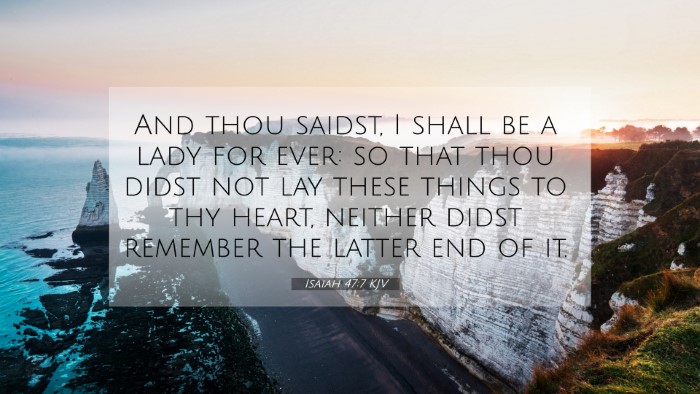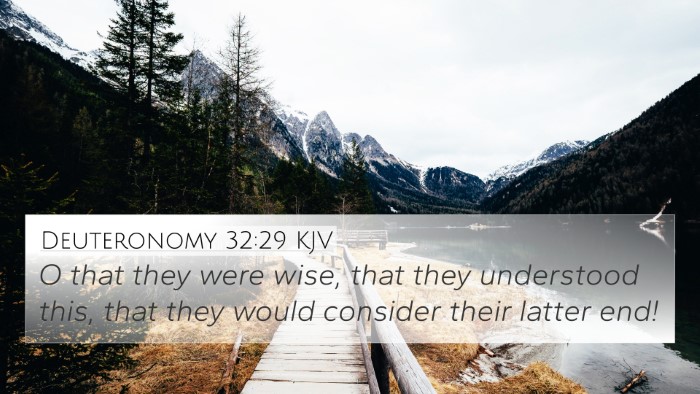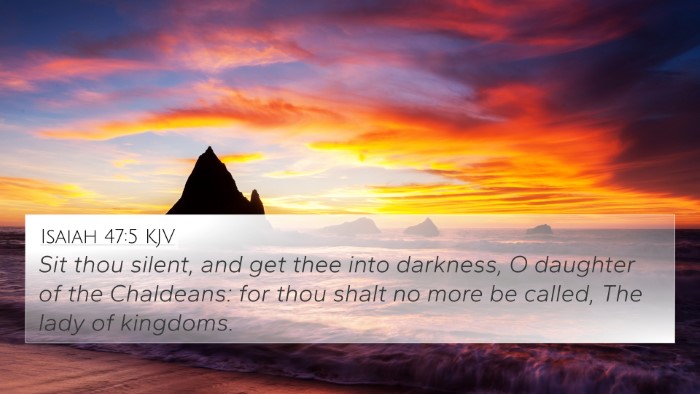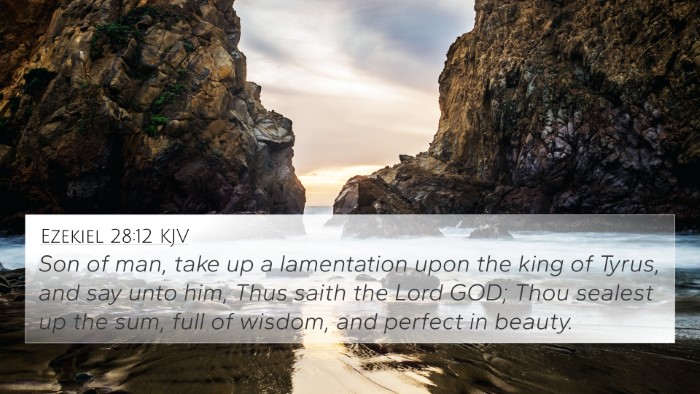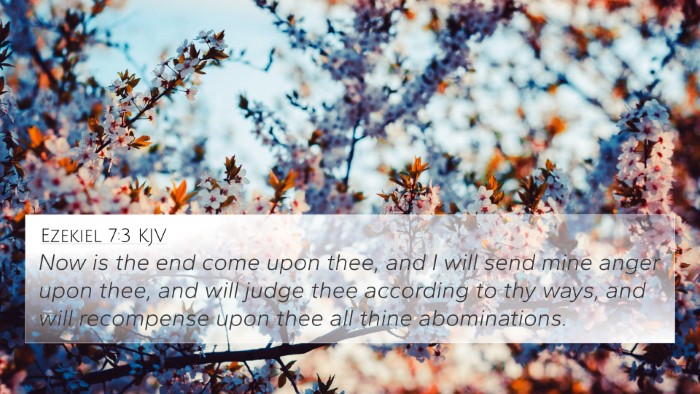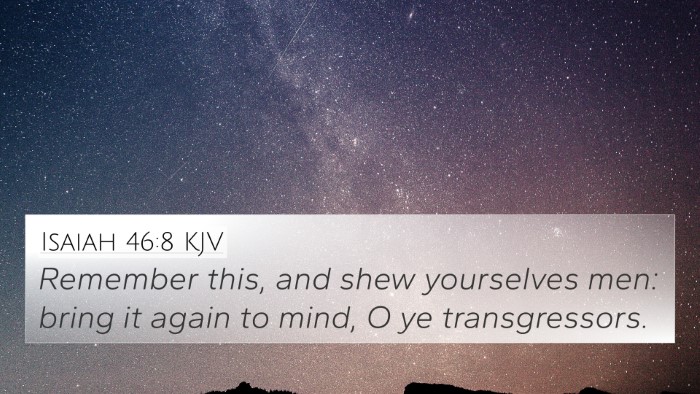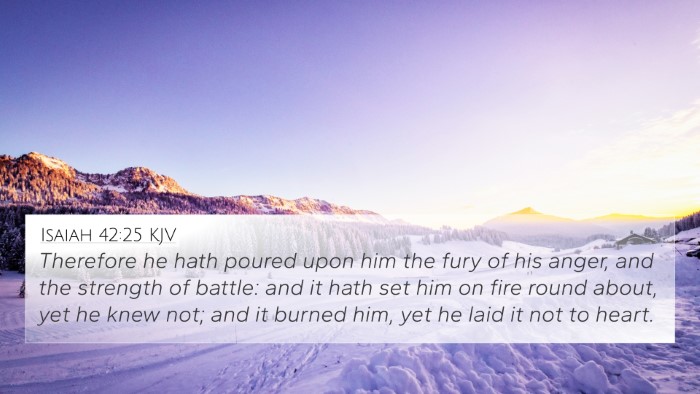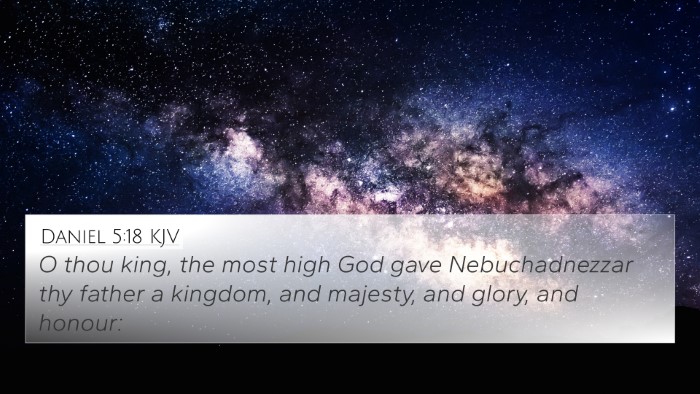Understanding Isaiah 47:7
Isaiah 47:7 states, "And thou saidst, I shall be a lady for ever: so that thou didst not lay these things to thy heart, neither didst remember the latter end of it." This verse unveils a critical theme of pride and overconfidence, particularly in the context of Babylonian culture and its eventual downfall.
To comprehend the significance of this verse, it’s helpful to include insights from various public domain commentaries, such as those by Matthew Henry, Albert Barnes, and Adam Clarke, along with relevant Bible cross-references.
Meaning and Analysis
The verse kindles a reflection on the mindset of Babylon, which believed itself invincible and above repercussions for its actions. As Matthew Henry notes, the inhabitants of Babylon displayed a foolish confidence in their perceived eternal security, neglecting the reality of divine judgment.
Moreover, Albert Barnes highlights that their claim of eternal dominance stemmed from a misguided sense of power rooted in their idolatrous practices, leading them to disregard God’s sovereign warnings.
Adam Clarke elaborates on the lack of introspection among the Babylonians, suggesting that their refusal to reflect on their fate ultimately sliced away the veneer of security they cultivated around themselves.
Key Themes
- Pride: The verse illustrates the dangers of pride and complacency when individuals or nations forget their standing before God.
- Divine Judgment: It serves as a reminder that God’s authority prevails regardless of human assertions of power.
- Lack of Awareness: A practical application seen in this verse is the call for self-examination and recognition of one’s own vulnerabilities.
Bible Verse Cross-References
The connections between Bible verses enrich understanding and provide a broader perspective on the themes presented in Isaiah 47:7. Here are notable cross-references:
- Jeremiah 50:31: “Behold, I am against thee, O thou most proud, saith the Lord God of hosts: for thy day is come, the time that I will visit thee.” This verse emphasizes God's opposition to pride.
- Isaiah 13:19: “And Babylon, the glory of kingdoms, the beauty of the Chaldees' excellency, shall be as when God overthrew Sodom and Gomorrah.” This illustrates Babylon’s fall due to its arrogance.
- Proverbs 16:18: “Pride goeth before destruction, and a haughty spirit before a fall.” This verse encapsulates the inherent dangers of pride, closely mirroring the message of Isaiah 47:7.
- Revelation 18:7: “How much she hath glorified herself, and lived deliciously, so much torment and sorrow give her: for she saith in her heart, I sit a queen, and am no widow, and shall see no sorrow.” This echoes Babylon's deluded confidence.
- Ezekiel 28:2: “Son of man, say unto the prince of Tyrus, Thus saith the Lord God; Because thine heart is lifted up, and thou hast said, I am a God, I sit in the seat of God.” Another example that showcases pride leading to inevitable destruction.
- 1 Peter 5:5: “God resisteth the proud, and giveth grace to the humble.” It highlights an ongoing biblical principle of God’s stance against pride.
- James 4:6: Similar to Peter’s assertion, this verse reminds believers of the dangers of arrogance.
- Ezekiel 7:4: “And mine eye shall not spare thee, neither will I have pity: but I will recompense thy ways upon thee.” This warning underscores inevitable judgment against those who forsake humility.
- Psalm 10:4: “The wicked, through the pride of his countenance, will not seek after God: God is not in all his thoughts.” This resonates with the theme of forgetfulness concerning God’s authority.
Conclusion
Isaiah 47:7 serves as a profound reminder of the consequences of unbridled pride and arrogance, urging readers to maintain a humble attitude and heed God's warnings. Through this analysis, including cross-references, we see how interconnected the teachings of Scripture are in illustrating the same core truths. Understanding these connections enriches one’s spiritual grasp and offers guidance on applying these lessons in daily life.
Tools for Bible Cross-Referencing
For those wishing to explore further into comprehensive Bible cross-reference materials, consider the following tools:
- Bible concordance
- Bible cross-reference guide
- Bible reference resources
- Cross-reference Bible study techniques
- Bible chain references
Application of Cross-Referencing
Knowing how to utilize Bible cross-references can significantly enhance your understanding and provide a richer context for interpreting Biblical themes. You can find connections between Old and New Testament scriptures, see detailed cross-references between the Gospels, and appreciate thematic links throughout the entire Biblical narrative.


